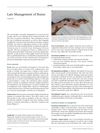 January 2019 in “ARC journal of pharmaceutical sciences”
January 2019 in “ARC journal of pharmaceutical sciences” Acne can be managed with various treatments and requires psychological support due to its emotional impact.
 26 citations,
July 2021 in “Frontiers in Cell and Developmental Biology”
26 citations,
July 2021 in “Frontiers in Cell and Developmental Biology” The review suggests that a special cell-derived treatment shows promise for various skin conditions and hair growth but needs more research for confirmation.
 15 citations,
September 2018 in “Dermatologic therapy”
15 citations,
September 2018 in “Dermatologic therapy” Both emollients effectively reduced itching and improved skin moisture in xerotic eczema.

Microneedle technology is effective for skin rejuvenation and enhancing cosmeceutical delivery, with ongoing innovation and increasing commercialization.
 1 citations,
September 2023 in “Dermatology and therapy”
1 citations,
September 2023 in “Dermatology and therapy” More research is needed to find the best treatment for dissecting cellulitis of the scalp.
11 citations,
January 2011 in “American journal of transplantation” Some patients developed hair loss after islet cell transplant possibly due to their immune-suppressing medications.
 9 citations,
March 2011 in “Oxidative stress and disease”
9 citations,
March 2011 in “Oxidative stress and disease” Some herbal treatments are effective for skin disorders, but more research and regulation are needed.
 71 citations,
March 2009 in “Seminars in cutaneous medicine and surgery”
71 citations,
March 2009 in “Seminars in cutaneous medicine and surgery” Alopecia areata can cause unpredictable hair loss, and treatments like corticosteroids and minoxidil may help but have varying side effects.
 January 2009 in “Springer eBooks”
January 2009 in “Springer eBooks” The document concludes that managing skin conditions during pregnancy is important and requires specialized care.
 72 citations,
July 2014 in “American journal of clinical dermatology”
72 citations,
July 2014 in “American journal of clinical dermatology” Some treatments, like corticosteroids and sensitizing agents, can help with alopecia areata, but more high-quality research is needed.
 33 citations,
September 2008 in “Dermatologic therapy”
33 citations,
September 2008 in “Dermatologic therapy” Doctors should know how to diagnose and treat PCOS, which often involves checking for high male hormone levels and using medications to manage symptoms.
 18 citations,
June 2019 in “Clinical research in dermatology”
18 citations,
June 2019 in “Clinical research in dermatology” Acne can't be cured but can be managed with treatments like benzoyl peroxide and diet changes; it's costly and can lead to scarring and mental health issues.
 11 citations,
July 2003 in “The Nurse practitioner”
11 citations,
July 2003 in “The Nurse practitioner” New treatments for PCOS focus on managing symptoms and improving fertility.
 151 citations,
February 2007 in “International Journal of Dermatology”
151 citations,
February 2007 in “International Journal of Dermatology” Alopecia areata causes hair loss, has no cure, and various treatments exist.

research Acne
4 citations,
January 2019 Acne is a common skin condition that can be influenced by diet, lifestyle, and hormones, and requires a treatment approach that includes psychological considerations.
April 2024 in “International journal of molecular sciences” Combination pharmacotherapy is generally more effective for treating keloids and hypertrophic scars.
November 2024 in “Psychoneuroendocrinology” Testosterone increases hair testosterone levels, stress raises hair cortisol, and relationship status affects hormone levels.
 January 2020 in “Asian journal of applied science and technology”
January 2020 in “Asian journal of applied science and technology” Good nutrition is crucial for health and preventing disease, and supplements can help prevent nutrient deficiencies.
 49 citations,
July 2004 in “Anesthesiology”
49 citations,
July 2004 in “Anesthesiology” The document concludes that more research is needed to understand how to treat muscle pain with drugs.
 2 citations,
January 2013 in “Elsevier eBooks”
2 citations,
January 2013 in “Elsevier eBooks” The chapter explains the causes of excessive hair growth and masculinization in women and how to measure hormone levels related to these conditions.
 26 citations,
December 2016 in “Psychiatric Clinics of North America”
26 citations,
December 2016 in “Psychiatric Clinics of North America” Testosterone therapy and surgeries like mastectomy improve transgender men's lives and mental health with low risks and high satisfaction.
 1 citations,
March 1954 in “Archives of dermatology”
1 citations,
March 1954 in “Archives of dermatology” Animal research has greatly advanced dermatology.
 53 citations,
October 1978 in “Archives of dermatology”
53 citations,
October 1978 in “Archives of dermatology” Zinc supplements can resolve skin issues caused by zinc deficiency.
 January 2024 in “Journal der Deutschen Dermatologischen Gesellschaft”
January 2024 in “Journal der Deutschen Dermatologischen Gesellschaft” Non-biologic immunosuppressive drugs are crucial for treating autoimmune and chronic inflammatory skin diseases.
 18 citations,
January 1999 in “CNS Drugs”
18 citations,
January 1999 in “CNS Drugs” Some anticonvulsant drugs can cause skin reactions, ranging from mild to severe, and managing these reactions is important for patient care.
 24 citations,
May 2013 in “Drug Design Development and Therapy”
24 citations,
May 2013 in “Drug Design Development and Therapy” Multimodal minoxidil microemulsion is more effective in treating hair loss than minoxidil alone.
 47 citations,
September 2016 in “Reviews in endocrine and metabolic disorders”
47 citations,
September 2016 in “Reviews in endocrine and metabolic disorders” The skin's ability to produce hormones is linked to various skin conditions, and better understanding this process could lead to new treatments.
 June 2002 in “Surgery (oxford)”
June 2002 in “Surgery (oxford)” The document says that treating burns late focuses on improving function, appearance, and helping patients return to normal life, using both non-surgical and surgical methods.
 3 citations,
January 2016 in “Elsevier eBooks”
3 citations,
January 2016 in “Elsevier eBooks” Steroid hormones are crucial for body functions and have various medical uses, but their misuse can lead to dependence.
 114 citations,
December 1951 in “Archives of Dermatology”
114 citations,
December 1951 in “Archives of Dermatology” Aminopterin strongly suppresses epithelial tissues and can treat certain skin conditions but has significant side effects.



























